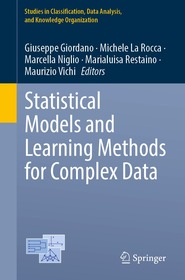
Statistical Models and Learning Methods for Complex Data
Series: Studies in Classification, Data Analysis, and Knowledge Organization;
- Publisher's listprice EUR 160.49
-
66 563 Ft (63 393 Ft + 5% VAT)
The price is estimated because at the time of ordering we do not know what conversion rates will apply to HUF / product currency when the book arrives. In case HUF is weaker, the price increases slightly, in case HUF is stronger, the price goes lower slightly.
- Discount 12% (cc. 7 988 Ft off)
- Discounted price 58 575 Ft (55 786 Ft + 5% VAT)
Subcribe now and take benefit of a favourable price.
Subscribe
66 563 Ft

Availability
Not yet published.
Why don't you give exact delivery time?
Delivery time is estimated on our previous experiences. We give estimations only, because we order from outside Hungary, and the delivery time mainly depends on how quickly the publisher supplies the book. Faster or slower deliveries both happen, but we do our best to supply as quickly as possible.
Product details:
- Publisher Springer Nature Switzerland
- Date of Publication 2 October 2025
- Number of Volumes 1 pieces, Book
- ISBN 9783031847011
- Binding Paperback
- No. of pages189 pages
- Size 235x155 mm
- Language English
- Illustrations VIII, 189 p. 51 illus., 40 illus. in color. Illustrations, black & white 700
Categories
Long description:
"
This book on statistical models and learning methods for complex data comprises a selection of peer-reviewed post-conference papers presented at the 14th Scientific Meeting of the Classification and Data Analysis Group of the Italian Statistical Society (CLADAG 2023), held in Salerno, Italy, September 11–13, 2023. The contributions span a variety of topics, including different approaches to clustering and classification, multidimensional data analysis, panel data, social networks, time series, statistical inference, and mixture models. These methodologies are applied to a range of empirical domains such as economics, finance, hydrology, the social sciences, education, and sports.
Organized biennially by international scientific committees, the CLADAG meetings advance methodological research in multivariate statistics, with a strong focus on data analysis and classification. They facilitate the exchange of ideas in these fields and promote the dissemination of concepts, numerical methods, algorithms, and computational and applied results.
Chapter ""Identification of misogynistic accounts on Twitter through Graph Convolutional Networks"" is available open access under a Creative Commons Attribution 4.0 International License via link.springer.com.
" MoreTable of Contents:
- Exploring latent evolving ability in test equating and its effects on final rankings.- Hidden Markov and related discrete latent variable models An application to compositional data.- An application of Natural Language Processing Analysis on TripAdvisor Reviews.- Modelling football players field position via mixture of Gaussians with flexible weights.- Estimation Issues in Multivariate Panel Data.- Testing linearity in the single functional index model for dependent data.- A multi-step approach for streamflow classification.- Identification of misogynistic accounts on Twitter through Graph Convolutional Networks.- Topic modeling of publication activity in Hungary and Poland in the fields of economics, finance, and business.- Circular kernel classification with errors-in-variables.- Classification Trees Applied to Time Lagged Data to Improve Quality in Official Statistics.- Trimmed factorial k-means a clustering application to a cookies dataset_Farné and Camillo.- Visualization of Proximity and Role-based Embeddings in a Regional Labour Flow Network.- Bridging the Gap Investigating Correlation Clustering and Manifold Learning Connections.- Improving Performance in Neural Networks by Dendrite-Activated Connection.- Regression models with compositional regressors in case of structural zeros.- Multi-Dimensional Robinson Dissimilarities.- Composite selection criteria for the number of components of a finite mixture for ordinal data.- Clustering of Italian higher education institutions based on a destination–specific approach.- Analyzing Italian crime data using matrix-variate hidden Markov models.
More



